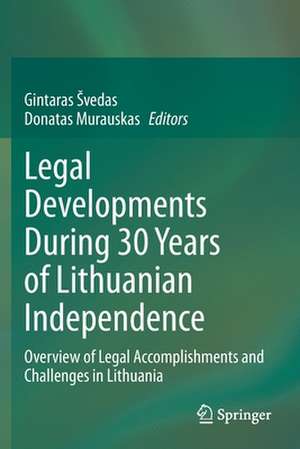Legal Developments During 30 Years of Lithuanian Independence: Overview of Legal Accomplishments and Challenges in Lithuania
Editat de Gintaras Švedas, Donatas Murauskasen Limba Engleză Paperback – 18 oct 2021
Over a period of 30 years since gaining its independence from the Soviet Union, Lithuania has undergone unique social changes. The state restarted its independent journey burdened by the complicated heritage of the Soviet legal system. Some major reforms have taken place swiftly, while others have required years of thorough analysis of societal needs and the search for optimal examples in other states. The legal system is now substantially different, with some elements being entirely new, and others adapted to present needs.
| Toate formatele și edițiile | Preț | Express |
|---|---|---|
| Paperback (1) | 945.79 lei 6-8 săpt. | |
| Springer International Publishing – 18 oct 2021 | 945.79 lei 6-8 săpt. | |
| Hardback (1) | 951.91 lei 6-8 săpt. | |
| Springer International Publishing – 18 oct 2020 | 951.91 lei 6-8 săpt. |
Preț: 945.79 lei
Preț vechi: 1153.39 lei
-18% Nou
Puncte Express: 1419
Preț estimativ în valută:
181.00€ • 187.53$ • 151.06£
181.00€ • 187.53$ • 151.06£
Carte tipărită la comandă
Livrare economică 21 martie-04 aprilie
Preluare comenzi: 021 569.72.76
Specificații
ISBN-13: 9783030547851
ISBN-10: 303054785X
Ilustrații: VI, 315 p. 2 illus., 1 illus. in color.
Dimensiuni: 155 x 235 mm
Greutate: 0.45 kg
Ediția:1st ed. 2021
Editura: Springer International Publishing
Colecția Springer
Locul publicării:Cham, Switzerland
ISBN-10: 303054785X
Ilustrații: VI, 315 p. 2 illus., 1 illus. in color.
Dimensiuni: 155 x 235 mm
Greutate: 0.45 kg
Ediția:1st ed. 2021
Editura: Springer International Publishing
Colecția Springer
Locul publicării:Cham, Switzerland
Cuprins
Part I: Complicated Historical Heritage: Dealing with the Totalitarian Past.- 1. Transitional Justice Cases Against Lithuania at the European Court of Human Rights.- 2. The Legal Framework for Administrative Liability in Lithuania: Lifting Legal Barriers to the Efficient Regulation of Administrative Offences.- 3. Development of Property Protection in Criminal Law During Lithuania’s Independence.- 4. Some Aspects of Economic Regulation in Lithuanian Constitutional Law: From Planned Economy to the Fourth Industrial Revolution.- Part II: Sophisticated Socio-Political and Other Conditions in the Process of Adoption to New (Rule of Law) Standards.- 5. Development of the Justice System in Lithuania: Revolution, Evolution or Involution?.- 6. Evolution of the Lithuanian Civil Procedure: Objectives and Reality.- 7. Development of Arbitration Law in the Republic of Lithuania After the Restoration of Independence.- 8. Understanding Legal Responses to Technological Change in Lithuania Since 1990: Examples of Assisted Reproduction and Skin Care Procedures Regulation.- Part III: Authority of International Legal Sources over a Period of 30 Years.- 9. Shift in the Role of Lithuanian Courts in the Context of Lithuania’s Membership in International Organizations.- 10. Forensic Examinations in Lithuania: 30 Years of Experience (1990–2020).- 11. Execution of Judgments of the European Court of Human Rights: Lithuanian Case.- Part IV: The Search for Experimental and/or Entirely New National Legal Models.- 12. The Development and Prospects of the Lithuanian Constitutional Justice Model.- 13. Constitutional Principles As a Criterion for Declaring Legal Regulation to Be Incompatible with the Constitution of the Republic of Lithuania.- 14. Administrative Liability in Lithuania: The Model of Corporate Administrative Liability.- 15. Collective Labour Law in Lithuania: Search for a National Model.- 16. Tendencies and Problematical Aspects of Criminal Liability of a Legal Person in Lithuania.
Notă biografică
Prof. habil. Dr. Gintaras Švedas, Vilnius University, Law Faculty, Vilnius, Lithuania
Asst. Prof. Dr. Donatas Murauskas, Vilnius University, Law Faculty, Vilnius, Lithuania
Textul de pe ultima copertă
This volume provides an overview of selected major areas of legal and institutional development in Lithuania since the Restoration of Independence in 1990. The respective chapters discuss changes in fields varying from the constitutional framework to criminal law and procedure. The content highlights four major aspects of the fundamental changes that have affected the entire legal system: the Post-Soviet country’s complex historical heritage; socio-political and other conditions in the process of adopting new (rule of law) standards; international legal influences on the national legal order over the past 30 years; and finally, the search for entirely new national legal models.
Over a period of 30 years since gaining its independence from the Soviet Union, Lithuania has undergone unique social changes. The state restarted its independent journey burdened by the complicated heritage of the Soviet legal system. Some major reforms have taken place swiftly, while others have required years of thorough analysis of societal needs and the search for optimal examples in other states. The legal system is now substantially different, with some elements being entirely new, and others adapted to present needs.
Over a period of 30 years since gaining its independence from the Soviet Union, Lithuania has undergone unique social changes. The state restarted its independent journey burdened by the complicated heritage of the Soviet legal system. Some major reforms have taken place swiftly, while others have required years of thorough analysis of societal needs and the search for optimal examples in other states. The legal system is now substantially different, with some elements being entirely new, and others adapted to present needs.
Caracteristici
Presents an in-depth analysis of 30 years of change in Lithuania’s legal and institutional framework Offers a representative case study for states experiencing similar transitions Allow us to learn from the errors made during the transition period, looking back on 30 years of experience
